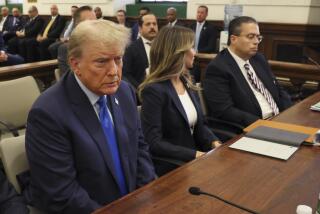Keating Offers Defense in S&L; Case : Courts: In his second fraud trial, former Lincoln executive makes his first attempt to rebut charges that he swindled investors.
- Share via
LOS ANGELES — Charles H. Keating Jr. began putting up a defense for the first time Wednesday to charges that he swindled Lincoln Savings investors and lived like a king on looted funds, leaving taxpayers with a $2.6-billion bailout bill.
In Keating’s securities fraud trial in state court last year, his lawyer offered no defense, contending that prosecutors never proved their case. But the flamboyant former multimillionaire was convicted and sentenced to the maximum 10 years in state prison.
Prosecutors in the current federal fraud, racketeering and conspiracy trial of Keating and his son, Charles H. Keating III, rested their case Tuesday, a month after they began.
The first defense witness, Keating’s son-in-law and former top aide Robert M. Wurzelbacher Jr., testified about many successful home-building and land development deals that Keating’s Phoenix-based American Continental Corp. did over the years.
Keating is accused of using straw buyers of land and securities to book phony profits, deceiving his outside auditors about the deals and misleading investors, many of them elderly Lincoln depositors who bought American Continental junk bonds. The bonds became worthless when Lincoln, based in Irvine, collapsed.
The enterprise was designed to use the frauds to pay huge salaries and perks to the Keatings and associates, the indictment says.
Wurzelbacher said he went to work for American Continental in 1978, holding many positions with it and subsidiaries of Lincoln, which American owned.
Assistant U.S. Atty. Alice Hill objected to U.S. District Judge Mariana Pfaelzer that the long recital of successful deals was irrelevant to the charges at hand, which focus on a few allegedly fraudulent land and securities deals.
Keating’s lawyer, Stephen C. Neal, responded that it was necessary to show the scope of Keating’s enterprises to disprove the charge that his entire operation was racketeering.
Neal said transactions at Hidden Valley, Ariz., where many sham deals allegedly occurred, were just like other transactions that had been successful. He said the only difference was that, with real estate values declining, the deals went sour, and the people involved were unhappy with the outcome.
The judge denied Neal’s motion to dismiss the case, although she indicated that she has some doubts about bankruptcy fraud charges contained in the 73 counts against Keating. His son faces 64 counts.
More to Read
Inside the business of entertainment
The Wide Shot brings you news, analysis and insights on everything from streaming wars to production — and what it all means for the future.
You may occasionally receive promotional content from the Los Angeles Times.









